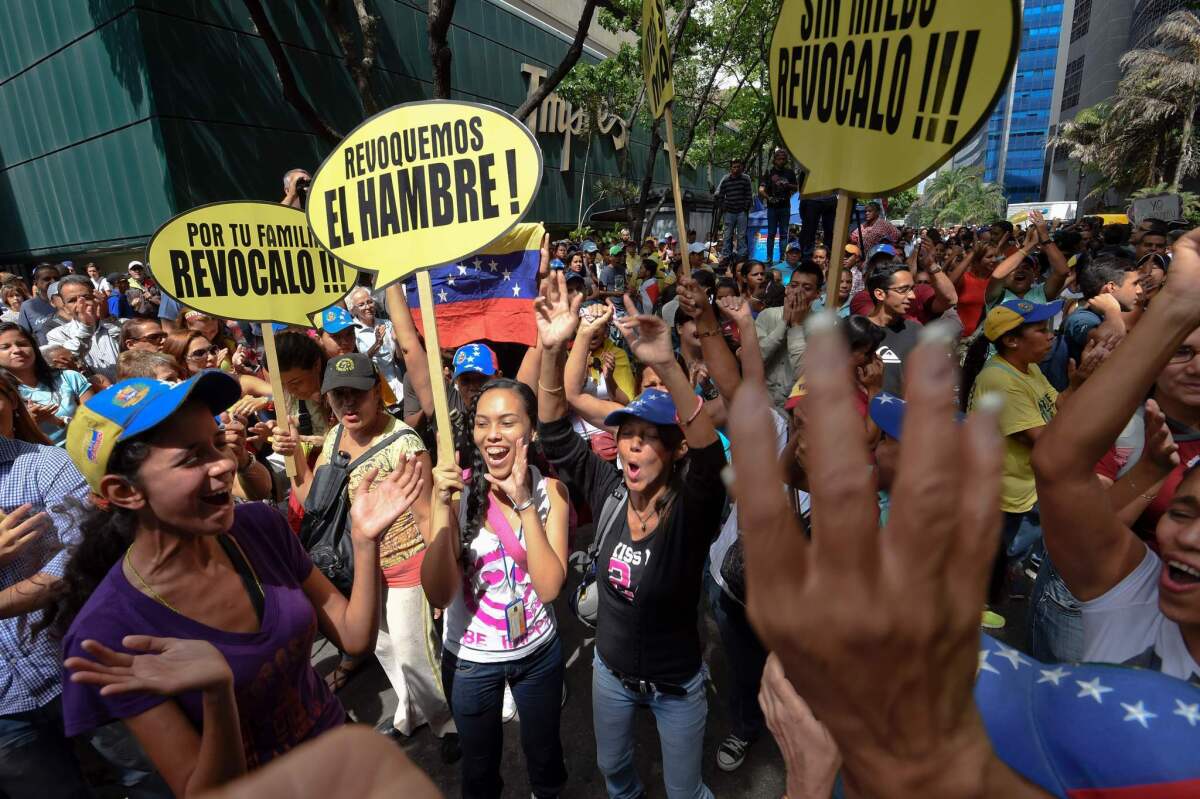In a country of chronic shortages, one thing is not hard to find: a political demonstration

- Share via
Reporting from Caracas — One day, thousands march through downtown Caracas in defense of embattled President Nicolas Maduro and the socialist legacy of his predecessor and patron, the late Hugo Chavez.
The next day, hundreds of government opponents gather in the streets to demand the recall of Maduro.
So it has gone for weeks in Venezuela. In this crisis-ridden nation plagued by shortages of everything from sugar to diapers to beer, one thing is not hard to find: a political demonstration.
Life can seem normal enough in the still-bustling capital. Gasoline for $2 or less a tank — the country is one of the world’s biggest petroleum producers — keeps the avenues filled with traffic. But political tensions have been intensifying amid massive inflation, out-of-control street crime, sporadic blackouts and a rapidly diminishing quality of life.
The well-choreographed rallies -- there have been three this week alone -- have emerged as the main outlets for political passions in a place where it seems that nobody is neutral.
With the mood so edgy, there are fears that the dueling protests could devolve into the kind of bloody demonstrations that shook the country for several months in 2014. So far, however, violent clashes have been limited.
The staged events share certain similarities, regardless of which side is protesting.
I support the president and all of his measures to defend the poor, to defend the workers.
— Miriam Gonzalez, 39
Baseball caps and T-shirts are prevalent under the tropical sun. Pro-government Chavistas, as government loyalists are known, after the ex-president who died in 2013, don the ubiquitous red of their party. Opposition parties tend to favor yellow and blue, the other colors in the national flag.
Each side purports to represent the poor, hoisting placards proclaiming their fidelity to the will of “the people.”
And each side insists its adherents are committed to nonviolent political solutions to the country’s problems.
But the similarities mostly end there.
The pro-government demonstrations are notably larger and better organized, benefiting from official cooperation and encouragement.
“The revolution is here to stay!” government loyalists chanted Tuesday as they marched from the Bellas Artes metro stop downtown, passing several apartment blocks built by the socialist government to house the poor.
“I am here to defend the revolution,” said Miriam Gonzalez, 39. “I support the president and all of his measures to defend the poor, to defend the workers.”
The facades of some buildings along the route featured huge renderings of Chavez’s flamboyant personal signature. Stenciled images of his forehead and eyes peered out from other buildings.
“Long live the eternal commander!” the government backers shouted as police watched indifferently.
Eventually the demonstrators reached the Miraflores presidential palace, where most pro-government marches end. Maduro, as is his custom, addressed the crowd this week from a platform on the palace grounds. He accused opposition demonstrators of beating up two police women -- a charge the opposition has denied.
The pro-government marchers said they were attending the rally voluntarily, denying opposition allegations that attendance was mandatory in order to keep their jobs, housing and other state-provided privileges.
The opposition rallies tend to have a more combative feel, as the protesters hope to bring down the government -- albeit by democratic means, they say.
Last week, security forces in riot gear used tear gas and prevented opposition marchers from descending on downtown Caracas for a planned foray to the offices of the national election board.
“The government will fall!” retreating opposition protesters shouted after being turned back.
They said blocking their path was unconstitutional -- and also accused officials of shutting down public transportation in an effort to thwart turnout.
The opposition returned to the streets of the capital Wednesday, this time marshaling hundreds of protesters in one of their strongholds -- the mostly middle-class district of Chacao.
“We want a peaceful change,” the governor of Miranda state, Henrique Capriles, told the crowd from a raised platform. Capriles, who narrowly lost to Maduro in the 2013 presidential elections, denounced the current government as a “cupola of corruption.”
The opposition, which won control of the legislative National Assembly in voting in December, says it has collected more than 1.8 million signatures in a petition to force Maduro to face a recall election. But an initial government review this week cited irregularities such as incomplete names.
“Recall now!” opposition protesters chanted Wednesday.
They rejected government depictions of the opposition as oligarchs or foils for the country’s long dominant, right-wing upper class.
“I only wish I were rich,” said Grecia Rivera, 51, a teacher from the Caracas suburb of El Paraiso. “This gathering represents for me the unification of a nation that has many social, economic and educational problems. We are asking for a change.”
Absent signs of political reconciliation, the escalating cycle of sparring demonstrations seems certain to continue.
“It’s essential that we show our presence and our resolve publicly,” said Ramon Muchacho, mayor of Chacao district and a member of the opposition.
On Thursday morning, buses and cars filled with young activists again clogged rush-hour traffic lanes on their way to downtown Caracas. Their destination: a government-organized march of university students “in defense of national peace and sovereignty.”
ALSO:
U.S. scientists have been quietly working in Hiroshima for decades
Why Bernie Sanders keeps popping up in California’s out-of-the-way places
Before the Grim Sleeper serial killings in South L.A., a gang rape in Germany
Special correspondent Mery Mogollon in Caracas contributed to this report.
More to Read
Sign up for Essential California
The most important California stories and recommendations in your inbox every morning.
You may occasionally receive promotional content from the Los Angeles Times.










